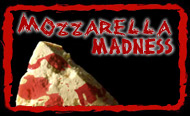
Ash vs. Evil Dead: Season One (2015)
Studio: Anchor Bay
Release date: August 23rd, 2016
Reviewed by: Brett Gallman (@brettgallman)
The movie:
I'm not sure which is more unbelievable: the fact that Ash vs. Evil Dead exists, or the fact that I’ve only just now managed to watch it. Certainly it wasn’t due to a lack of interest (I was obviously very hyped for it in last year’s Halloween list), but a combination of bad timing, work, and life generally getting in the way managed to put it on a perpetual backburner. Along the way, some natural trepidation began to creep in: could Ash vs. Evil Dead possibly live up to the anticipation?
It’s a follow-up that’s been practically 23 years in the making, something that’s rarely a recipe for success (though, curiously, one of the better examples—Psycho II—was also released 23 years after the original). In many ways, this was the horror genre’s version of The Force Awakens: a long-awaited sequel that many of us never thought we’d see, and, while it was nice to finally see Sam Raimi return to his demented baby, how crushing would it be if it didn’t deliver after all these years?
It turns out I had very little to worry about; what’s more, it takes the series all of about five minutes to alleviate any lingering doubts when it reveals that Ash (Bruce Campbell)—still a department store stock boy 30 years removed from his experience battling evil—has unleashed hell in the most Ashley J. Williams manner possible. In an effort to impress a woman by reading some of his “poetry,” a very high Ash unwittingly cracks open the Necronomicon, reads a few passages, and once again finds himself responsible for fending off evil. Yep, that’s our Ash—the same dimwitted (but weirdly badass) blowhard he always was. As ridiculous as this inciting incident is, it’s also absolutely perfect—not to mention proof that Raimi, Campbell, and Rob Tapert absolutely remember the charm of The Evil Dead: more than anything, this has always been a vehicle for its director to put his star through utter hell.
In this regard, no one has missed much of a step, especially Campbell, who slides back into the role of Ash with ease. After a disconcerting couple of minutes during his re-introduction, it becomes difficult to believe he’s actually spent over 20 years away from this character. He lays it on a little thick at first, almost as if he’s over-doing it, but then you realize that this is exactly who Ash is: everything he does is a put-on, a display of false bravado with zero sense of self-awareness backing it up. He mercilessly hits on every woman he sees, needles his co-workers, and generally irks anyone he encounters. When one of his trailer park neighbors tells police he was an “asshole,” you’re inclined to agree. Ash is kind of an asshole—but he’s our asshole.
Sort of like that one shady uncle (as opposed to that total asshole uncle you know will vote for Trump), Ash means well despite his questionable personality quirks. He’s the type of guy who called a Native American acquaintance a “bad drunk” who “liked the firewater” but insists he only did so before he knew it was racist. He’s fun to be around often despite himself, and Campbell’s naturally gregarious charisma keeps Ash vs. Evil Dead afloat through all ten episodes. Because the plot is admittedly threadbare (in keeping with the original two films, it’s basically “Ash awakens evil and goes through hell”), some lulls naturally occur (one two-episode stretch especially sags under exposition), yet it never feels like a drag because it’s just fun to have Ash back doing his thing.
If there’s a word that best summarizes the first seven episodes or so of Ash vs. Evil Dead, it’s “enjoyable.” Maybe it’s because the move to television almost subconsciously results in a different level of expectations for what this should be, but the series finds a nice balance between the “ultimate experience in grueling terror” and the high fantasy splatstick elements that came to define the series. An almost perfect blend of Dead by Dawn’s over-the-top splatter and the balls-out weirdness of Army of Darkness, the series doesn’t lack that sense of spirited, reckless abandon that propelled Raimi to the ranks of horror’s most revered auteurs. While Raimi only helms the pilot episode here (and boy does his energy burst at the seams when confined to 30 minutes), those who take up the reins do a fairly good job of recapturing his irreverent verve.
Capping each episode at 30 minutes is also a crucial decision: because the series thrives on that manic, reckless energy, it’s hard to imagine it sustaining that for any longer. Each episode roars in and zips right on by, often propelled by hellacious and wildly gory encounters with Deadites and buoyed by just enough character work to keep it from being a mindless, empty romp. Given the evolving nature of this franchise, it’s fitting that Ash vs. Evil Dead doesn’t completely mimic what came before it; while it’s not the marked departure that Army of Darkness was, it’s obviously much different from the first two films. The splatstick remains intact, but it’s channeled through a buddy road comedy that starts and stops in fits and bursts. I imagine it would make for poor binge-watching because the narrative cycle (basically, Ash and his friends make pit stops, battle evil, and move on) does become a bit repetitive.
But when taken in the small bursts as designed, Ash vs. Evil Dead is a remarkable amount of fun. Most tellingly, it doesn’t just rely on its two title characters, as it surrounds our hero with companions when fellow Value Stop* employees Pablo (Ray Santiago) and Kelly (Dana DeLorenzo) are drawn into his quest to defeat evil. The three form a somewhat testy loose alliance that’s forged into actual camaraderie as the series progresses (being constantly splattered in blood together will do that, it seems). Watching what has been a historically one-man show turn into an ensemble is interesting: at first, there’s a natural inclination to resist it because we just want to hang out with Ash.
Over time, however, Santiago and DeLorenzo win you over with their sharp wits and amiable personalities. They’re almost diametrically opposed to Ash in the sense that they aren’t jerks, and it’s interesting to see them rub off on him; in many ways, they’re responsible for dragging his inner goodness out of him. Sure, he never drops his Lothario act and remains committed to making bad decisions until the end, but he reveals a soft-hearted vulnerability that’s been buried beneath 30 years of trauma. It turns out that his experience with evil has taken a toll, and Campbell wonderfully reveals as much at various points. Sometimes it’s during an outrageous drug trip; at other times, it’s more subtle, such as when he’s forced to finally go back and confront his nemesis at the source.
(Let’s do a mild spoiler warning from here on out.)
In hindsight, it seems inevitable that Ash would eventually return to the infamous cabin for this season’s climax, but it’s brilliant how the turn of events sneaks up on you. For seven episodes, you watch a somewhat loose, disparate sequence of events play out, and, you know, it’s fun enough—I could watch Ash blast Deadites back to hell for hours on end. However, it’s almost disarming in its frivolity and lightheartedness; in what looks to be a brilliant move, Raimi and company seemingly don’t try to deliver whatever you might expect an Evil Dead 4 to be—until they do.
And holy shit, do they ever deliver: the last three episodes of Ash vs. Evil Dead more or less feel like something I’ve waited twenty years for. Little nuggets of continuity are sprinkled throughout the first seven episodes—Ash’s story is accompanied by footage from the first two films, and Lucy Lawless’s mysterious character has a huge connection to the lore (and this is not to mention she’s carrying around Ash’s severed hand)—before the climax essentially becomes Evil Dead 4.
Actually, if you’re the type who didn’t much care for the change in direction with Army of Darkness, this is your Evil Dead 3, complete with that foreboding, dilapidated cabin (the swing still rocks on its own after all these years), its work shed, and its hellacious cellar. When the unseen evil roars through these familiar woods via that patented Raimi-cam, it’s impossible not to smile. This is the horror geek’s equivalent of “Chewie, we’re home,” only “home” still teems with Ash’s evil doppelganger, talking severed heads, and demonic hellspawn.
Is it a bit heavy on fan-service? Sure, but Raimi and company absolutely earn the right, and they’re not simply coasting on nostalgia. I imagine it would have been much easier to rush to this moment or simply churn it out in a 90-minute feature, yet this franchise has never particularly gone in a straight line. It follows, then, that Ash vs. Evil Dead would only be interested in retracing steps after 3 and a half hours of earning the viewers’ investment in a new cast of characters that makes the climax thrive beyond pure nostalgia. As fun as it is to watch Raimi torment Campbell one more time, it’s even more rewarding that it really means something beyond empty wistfulness.
Ash’s 30-year struggle obviously registers, but the same is also true of the relationships he forms during this season. Without that, the climax likely doesn’t work—it’s a testament to this series that is somehow becomes about more than just Ash. Imagine if you'd spent three hours with the bunch from the original film before watching them get ripped to shreds--that's basically what happens here, and it elevates the proceedings from being an enjoyable romp to a completely worthy follow-up. When I marathon this franchise in the future, these last three episodes will be a part of it. This 90-minute block is that good.
Are there bumps in the road along the way? Naturally. Some episodes spin their wheels a bit, some character moments feel a bit forced, and some of the digital effects work is shaky. All of these are ultimately minor quibbles, though, and it’s especially easy to overlook some of the CGI shortcuts when so much of the series relies on practical effects. If nothing else, it’s a testament that Sam Raimi (and associates) is still committed to dreaming up weird, demented, and gory set-pieces. When gifted a budget for a ten-episode television series, he makes the most of it—there’s a sense that he’s still a kid playing in a sandbox, only the sandbox was never this deep or spacious even twenty years ago.
More importantly, he still rummages through it with the same devil-may-care approach he did when he was stringing together a low-budget 16mm spook-a-blast in the Tennessee wilderness. Some things change, but you can be damn sure that Evil Dead will always be at its best when Bruce Campbell’s face is soaked in geysers of blood.
*Even though it seems pretty likely Ash got fired from S-Mart (I mean, come on, he’s Ash), he’s forced to change jobs here due to rights issues that have turned Army of Darkness into something of an elephant in the room—even though nothing directly discounts its existence, it’s not referred to either. Here’s hoping Starz can work something out so this series can be even weirder going forward.
The disc:
Even though I recorded every episode of Ash vs. Evil Dead on my DVR, it occurred to me that I might as well wait for the Blu-ray release, if only for the bump in presentation quality that comes from a disc (physical media for life, obviously). I’m happy to report that Anchor Bay’s Season One release delivers in this regard: the show—which looks about as sleek and polished as you’d expect for satellite television—looks fantastic, and the audio is terrifically aggressive. This is often a loud sonic assault, so prepare for your speaks to get a workout (you might also want to keep your finger hovering over the volume—this thing often goes from “soft” to “loud” in the space of a scene).
The extras are a bit light, however. Mostly composed of fluff featurettes, the supplements are headlined by “Inside the World of Ash,” a 16-minute blow-by-blow of each episode. Showrunner Craig DiGregorio figures most prominently, though Raimi does chime in with some brief thoughts about directing the first episode. I was hoping for something a bit more substantial, particularly since the road to a new Evil Dead has been such an ordeal—it would have been nice to see more about the origins and how this finally came to be after all these years.
Remaining features are even fluffier: a 2-minute “How to Kill a Deadite” supplement has cast members (including Campbell) discussing the Deadite encounters, while a “Best of Ash” bit compiles all his memorable moments from the season into something resembling a trailer. To be fair, there are audio commentaries for each episode with various participants (Sam and Ivan Raimi, Tapert, and Campbell are on board for the first episode and Campbell’s on board for all but two of the rest).
All told, it’s a fine release that feels like it’s missing a one substantial extra feature to put it over the top. Otherwise, it’s a fairly-priced two-disc affair that’s bound to be double-dipped anyway if this franchise’s history is any indication. For now, this edition will do, especially since this first season is almost impossibly good—I will have no problem sliding this release on my shelf right next to the original trilogy (if only there were a rubbery “Book of the Dead” edition for old time's sake). This was worth the wait and then some, and the best part? We’re just getting started since Ash vs. Evil Dead is set to return for Season Two on October 2nd. Groovy. comments powered by Disqus Ratings:








